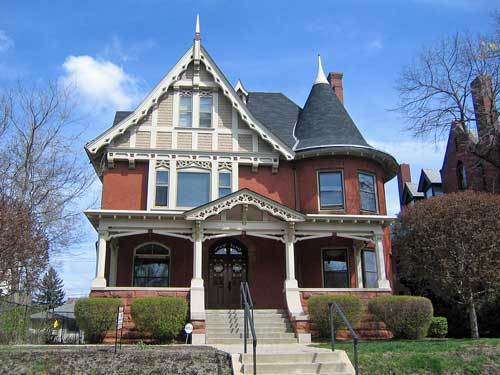In some cities you will find pigeons in the parks. We have these birds along the Mississippi River, but they don’t look like pigeons. My dog is afraid of them.
Month: April 2007
Gothic Style
The Gothic style of architecture dates back to Europe in the 1200s. This home is an example of Gothic Revival, popular in the U.S. during the mid-1800s.
With Gothic-style windows with distinctive pointed arches; exposed framing timbers; and steep, vaulted roofs with cross-gables. Extravagant features may include towers and verandas. Ornate wooden detailing is generously applied as gable, window, and door trim.
The home pictured is located on the 600 block of Summit Avenue. Gothic style homes can be almost overwhelming they are so ornate, but this one is a bit simpler and has examples of all of the details that can be found in elaborate Gothic style homes of the same period.
Minnesota Mortgage Reform Proposal
Pawlenty proposes legislation to Strengthen mortgage regulation in Minnesota
- Mortgage originator licensee to be a Minnesota corporation or other business entity and meet minimum net worth or bond requirements.
- Authorize the Department of Commerce to periodically examine mortgage companies
- Loan officers would be required to take 16 hours of educational training.
"The new proposals support the Guidelines on Nontraditional Mortgage Products that were sent to all licensed mortgage originators by the Minnesota Department of Commerce in December of 2006. The guidelines encourage lenders to make more meaningful disclosures and more careful underwriting to protect consumers from mortgage products they cannot afford."
I am not sure about the guidelines that "encourage" lenders to protect consumers from mortgage products they can not afford. – – what exactly does encourage mean?
Currently the mortgage industry is not very closely regulated. Just about anyone can get a mortgage brokers license. It doesn’t cost much or take long. Some of the standards in the proposed legislation are the same that are currently applied to the real estate and insurance industries.
**** Read More update from the Minnesota Association of Realtors **********
Buyers Agent or Sellers Agent?
I can’t write this post without including language on what agency is. The five kinds of agency relationships in real estate recognized by the state of Minnesota:
- Seller’s Agent: representing and acting for the seller only. May be a listing agent, or any REALTOR® licensed to the listing broker, or a selling subagent.
- Subagent: a broker or salesperson who is working with a buyer, but represents the seller.
- Buyer’s Agent: representing and acting for the buyer only. As with a listing contract with sellers, an agreement for buyer representation must be in writing.
- Dual Agent: one licensee representing both the seller and the buyer as clients in one transaction, or two agents licensed to the same broker, one of whom represents the seller and one of whom represents the buyer in one transaction. This requires full disclosure and informed consent of both parties. Dual agents have a limited role, must not advocate or negotiate for either party, and must not act to the detriment of either party.
- Facilitator: a real estate licensee who works for a buyer, a seller or both in a transaction but does not represent either in a fiduciary capacity as a Buyer’s Broker, Seller’s Broker or Dual Agent. Facilitators may perform services for consumers, but do not represent them. Facilitators are bound by license law and common law, but owe only the fiduciary duty of confidentiality unless other fiduciary duties are agreed to between licensee and consumer.
Buyers and sellers both like to ask me if I am a buyers agent, or a sellers agent. Some of these conversations have revealed some mis-information about dual agency. Dual agency happens only when an agent, or the agents broker, or more than one of the brokers agents are working on behalf of that broker and representing both parties in the same transaction.
I am both a buyers agent and a sellers agent. I do encounter situations where I am asked to do both. I prefer not to, but I can and under some circumstances I have. When I do both buyer and seller get to listen to my dual agency speech. In general when I am acting as a sellers agent or listing agent I represent the sellers and when I am working as a buyers I am representing the buyers.
As an agent I find that having both experiences on a regular basis is an asset. When it comes to negotiating an offer no matter which side I am representing I have a clear understanding of what the other party might want, or how they might be feeling about it all.
Real estate is about people and buying or selling property is a large and important transaction, and there are always emotions involved. Having experience with sellers helps me advise buyers and having experience with buyers helps me advise sellers and understand how to market their home. I can see the home through the buyers eyes, just as I can see the buyers offer from the sellers point of view.
If I were choosing an agent I would not consider it an advantage to work with an agent that only represents buyers or one who only represents sellers. I would consider it an advantage to have my own agent representing my best interests instead of an agent who is operating in the dual agency roll and representing both parties. Like it says above:
"Dual agents have a limited role, must not advocate or negotiate for either party, and must not act to the detriment of either party."
Buyers who go from open house to open house or the agent listed on each sign, to see each home, run the risk of working with an agent in a dual roll. Get your own agent.










